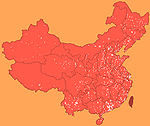Robert Park
On Christmas Day, Mr. Park, brazenly crossed the frozen Tumen River that separates North Korea from China; into the ice, so to speak.
The Washington Post today notes that Park's "Christianity" itself may be [seen by] the North Korean regime as the real instigator or danger here. Though North Korea's constitution guarantees freedom of religion, in reality the government severely restricts religious observance, allowing only worship at sanctioned churches.
Underground worship and distribution of Bibles [often] mean[s] banishment to a labor camp or even execution, according to defectors and activists. Still, according to such sources, more than 30,000 North Koreans are practicing Christianity in hiding.
[Data on other religious practice in North Korea is even less available or known, apparently.]
Mr. Park's crossing also comes just months after the country freed two U.S. journalists, who were arrested along the Tumen and sentenced to 12 years of hard labor for trespassing and "hostile acts." They were released to former President Bill Clinton on a visit to the isolated country in August. (North Korea and the United States do not have diplomatic relations).
And it likely goes without saying further, but this small act "could complicate Washington's efforts to coax North Korea back to negotiations aimed at its nuclear disarmament."
Park had an exclusive interview with Reuters last week before starting on his journey. The following are excerpts from that conversation.
Robert Park: The North Korean human rights crisis by murder rate is the worst in the world. An estimated 1,000 people a day die by starvation and starvation is a murder case. North Korea has been sent more food aid than any nation in the world but the food has not gone to the people who need it. So this is murder.
But not only that, there are concentration camps in North Korea that are of the same brutality as in Nazi Germany.More of his comments can be found here.
Responsible governments are completely silent about the issue. The United States, China, Russia, Japan and South Korea have a huge responsibility to speak out about this because all these nations played a role the arbitrary division of the Koreas, where not a single Korean was consulted. Yet the lives of these people are of no issue to these governments. That is a crime.
It is a huge crime.
What is happening in North Korea is genocide. We know there are legitimate fears about what could happen through nuclear weapons. But a nation that runs concentration camps, a nation that kills men, women and children without any kind of restraint can never be trusted.
We believe the resolution to this whole crisis is simply addressing North Korea honestly about this has to change.
We do not hate people. I am Christian, but I do have to say that this is not a legitimate government. We cannot talk to North Korea as if it is a legitimate government, but we need to liberate North Korea. We need to have a vision for the unification of Korea. It has to happen immediately because people are dying by the thousands every single day.
One person can make a difference as Christ taught and all religion generally extols.
It remains to be seen whether Robert Park shall become a martyr or merely one more lost and forgotten soul among the millions.
Let the New Year begin in prayer for them (and us) all.






















